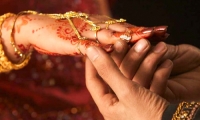
Green Card for a Bangladeshi Widow(er) of a U.S. Citizen
Bangladeshi Widows or widowers who were married to U.S. citizens at the time of the citizen’s death may apply for a green card.
Until October 28, 2009, you had to have been married to the deceased citizen for at least two years at the time of the deceased citizen’s death, in order to immigrate as the widow(er) of U.S. Citizen. Congress removed this requirement, effective October 28, 2009.
To immigrate as the Bangladeshi widow(er) of a U.S. Citizen, you must prove that you were legally married to the citizen, and that you entered the marriage in good faith, and not solely to obtain an immigration benefit.
Bangladeshi Widow(er) With Pending or Approved Immigrant Petition
If you were married to a U.S. citizen who had filed Immigrant Petition for you before he or she died, you will be eligible to immigrate as a widow(er). Your unmarried children below 21 years of age will also eligible to accompany and join with you.
To qualify, you must not have been divorced or legally separated from the U.S. citizen at the time of death. Your eligibility to immigrate as a widow(er) ends if you have remarried.
Bangladeshi Widow(er) Without a Pending or Approved Immigrant Petition
If you were married to U.S. citizen before the citizen’s death, but had no Immigrant Petition called I-130 petition filed on your behalf, you can still qualify to file self-petition as an “immediate relative” if you have not been divorced or legally separated from the U.S. citizen at the time of death.
Your eligibility to immigrate as a widow(er) ends if you have remarried. You must file self-petition in due form and due process of law within 2 years of U.S. citizen’s death, but no more than 2 years after the death of your citizen spouse.
If, however, you were married less than 2 years, and your citizen spouse died before October 28, 2009, you must file your petition no later than October 28, 2011.
VAWA Self-Petitioning Spouse or Child of a U.S. Citizen or Lawful Permanent Resident or a VAWA Self-Petitioning Parent of U.S. Citizen Son or Daughter
Many Bangladeshi Nationals feel trapped in relationships with abusive family members who threaten to withhold filing the immigration petitions required to get the green card application process started and completed. Some Bangladeshi Nationals are afraid to report domestic violence to the police or seek help causing them to remain in abusive relationship. If you are a Bangladeshi National married to a U.S. citizen or a lawful permanent resident (LPR or green card holder), and you are the victim of domestic abuse by that person, you may qualify to file an immigrant visa petition under the Immigration and Nationality Act, as amended by the Violence Against Women Act or VAWA. Even if you are divorced, you may also qualify. Battered Bangladeshi spouses and abused children of U.S. citizens and green card holders, and Bangladeshi parents of U.S. citizens may also be eligible.
If you qualify as a battered Bangladeshi spouse, you may be eligible for legal permanent residence under the Violence Against Women Act (VAWA) if you were subjected to battery or extreme cruelty in the United States. As a battered Bangladeshi spouse, child or parent, you may file an immigrant visa petition under the Immigration and Nationality Act (INA), as amended by the Violence Against Women Act (VAWA).
The VAWA provisions in the INA allow certain Bangladeshi spouses, children, and parents of U.S. citizens and certain Bangladeshi spouses and children of permanent residents (Green Card holders) to file a petition for themselves, without the abuser's knowledge. This allows victims to seek both safety and independence from their abuser, who is not notified about the filing.
The VAWA provisions, which apply equally to women and men, are permanent and do not require congressional reauthorization.
VAWA Self-Petitioning Spouse or Child of a U.S. Citizen or Lawful Permanent Resident or a VAWA Self-Petitioning Parent of U.S. Citizen Son or Daughter
If you are living abroad at the time of filing your petition, you may file the petition if:
1. The abuser is an employee of the U.S. Government;
2. The abuser is a member of the uniformed services; or
3. You were subjected to battery or extreme cruelty in the United States.
You may petition for immediate relative or family-sponsored immigrant classification for yourself (also known as a self petition) if you:
1. Have a qualifying relationship with an abusive U.S. citizen or lawful permanent resident;
A. Are now or were the spouse of an abusive U.S. citizen or lawful permanent resident;
B. Are the child of an abusive U.S. citizen or lawful permanent resident; or
C. Are the parent of an abusive U.S. citizen son or daughter who is at least 21 years of age
when filing this petition;
2. Are eligible for immigrant classification based on that relationship;
3. Are now residing with or have resided with the U.S. citizen or lawful permanent resident abuser in the past;
4. Have been battered by or have been the subject of extreme cruelty perpetrated by:
A. Your U.S. citizen or lawful permanent resident spouse during the marriage, or you are the
parent of a child who has been battered by or has been the subject of extreme cruelty
perpetrated by your abusive U.S. citizen or lawful permanent resident spouse during your
marriage;
B. Your U.S. citizen or lawful permanent resident parent while residing with that parent; or
C. Your U.S. citizen son or daughter;
5. Are a person of good moral character; and
6. Are a spouse, and entered into the marriage to the U.S. citizen or lawful permanent resident abuser in good faith.
NOTE: You may file a self-petition within two years of the date of the U.S. citizen abuser’s death, within two years of the U.S. citizen or lawful permanent resident abuser’s loss of status as a result of an incident of domestic violence, or within two years of the termination of the marriage to the U.S. citizen or lawful permanent resident abuser if there is a connection between the termination of the marriage and the battery or extreme cruelty. For self-petitioning spouses, you may remarry after U.S. Immigration Department approves your self-petition without affecting your eligibility to become a lawful permanent resident or have grounds for revocation of the approved self-petition.
Disclaimer: The information in this web site does not constitute legal advice. We make no guarantees about the accuracy or adequacy of the information contained or linked to this web site.






